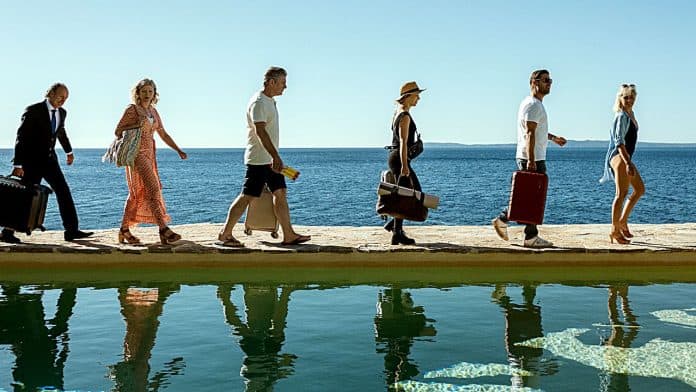Two Summers follows a group of friends who reunite for a holiday together but only end up being haunted by the events of a similar holiday from 30 years ago.
Story
Peter, Stef, Luk, Didier, Sofie, Saskia and Romée are friends who have known each other all their lives. Some found their partners in each other, like Peter and Romée, while others separated after a while, like Luk and Saskia.
The group of friends decide to meet again for a holiday, just like they did 30 years ago, at Peter and Romée’s private island. On the evening before the reunion, Peter receives a video from the holiday in 1992 in which he and his friends are seen sexually assaulting Sofie who’s in an unconscious state.
The blackmailer asks for money in return. As the whole group reunites for a jovial get-together after a long time, the secret that Peter, Stef, and Didier have guarded all these years is at the risk of being thrown in front of the whole world to watch.
They know that the blackmailer is one of their friends. As mistrust and suspicion malign the mind of the guilty, a struggle begins to guard a secret that could put an end to the life of everybody who was involved in the unspeakable act from that unfateful night 30 years ago.
Performances
Tom Vermeir, An Miller, Kevin Janssens, Herwig Ilegems, Ruth Becquart, Inge Paulussen, and Sanne Samina Hanssen form the central cast along with their younger counterparts played by Lukas Bulteel, Marieke Anthoni, Tijmen Govaerts, Bjarne Devolder, Tine Roggeman, and Louise Bergez respectively, except Hanssen, who plays Lia, a character that doesn’t appear in the 1992 timeline.
All the actors are given strong characters with enough opportunities to explore the boundaries of nuance but not everybody gets a ride on the bandwagon of people who utilise this potential well. The younger cast, especially, does an impressive job of familiarising these characters to the viewer.
Tijmen Govaerts, as young Luk, is especially notable with Tom Vermeir, as the older Peter, stealing the spotlight from other actors with his screen presence.
Among others, notable mentions also include An Miller and Ruth Bacquart who put up convincing performances, along with Tine Roggeman who plays the older Stef.
It’s also worth mentioning that Inge Paulussen is wronged by the writers, as well as, by her performance as Sofie.
Positives
The core of the plot is strong as there is inherent suspense and tension in the premise. Although, it’s not the first time such a plot thread is being explored.
By employing parallel timelines, the makers successfully evoke curiosity and maintain interest as it’s rare when the whole picture is clear to the viewer.
The series does concern itself with important and contentious themes that involve questions around consent, guilt and ownership. A mention of #MeToo in one of the conversations makes it all the more topical as the characters are shown to be aware of the times they live in, making it all the more relevant for the characters to be responsible for their actions.
Another definite strength is the interesting bunch of characters that are presented. Especially, the younger bunch of characters have a certain liveliness around them while projecting a warmth that encapsulates the experiences of the youth.
Negatives
It’s the older versions of the characters who disappoint. While their point of view is understood, they remain shallow and the conviction remains missing.
The premise provided ample opportunity for the makers to reflect guilt and remorse through the characters. But what ends up in the final presentation is a surface-level exploration of what could be termed as a sliver of remorse that the characters rarely reflect with genuineness.
Even with exploring some relevant themes, the series extinguishes all hopes of presenting a moving and microscopic scrutiny of what consent and complicity look like in exchange for some long sequences of clearly guilty guys contemplating the consequences of their wrongdoings coming to light.
Additionally, the casting and characterisation remain inconsistent between the two timelines. It could be confusing to relate the two versions of the same character.
Verdict
To summarise, Two Summers feels like a wasted opportunity of presenting something meaningful. It does evoke serious questions but achieves little to answer any. In the end, some changes in certain creative choices could have heavily impacted the course this series would have taken. Even then, it remains worth watching so one can eventually end up being disappointed in all the things that Two Summers could have done right but chooses not to.
Rating: 2.5/5
Also Read: Two Summers summary and ending explained

